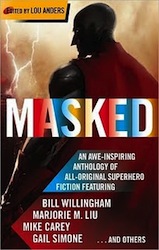Masked is a new superhero short story anthology edited by Lou Anders for Gallery Books. It’s been getting a lot of favorable press, and I have now joined the choir singing its praises (and I’m not just being nice out of favoritism to fellow bald tor.com contributors). Some of the stories are creepy, some fun, a few are heartbreaking and all are compelling. But rather than talk about specific stories, I want to tell you why I enjoyed the anthology as a whole and avoid all spoilers.
I have a love/hate relationship with comic books. I love superheroes and hate that I can’t spend all day reading about them! Pesky real life, getting in the way. As I wrote a while back, comic books helped me overcome my difficulties with reading when I was a teenager, and as a result I have an undying affection for the medium.
The anthology succeeds for several reasons. First, it’s clear that Anders knows what he’s doing and set the bar very high. He understands why comic books are important. In the introduction he writes: “…now is the true ‘golden age’ of comics, the best time to appreciate their wonders. All the history, and diversity, that has come before gives us such a rich playground now, a cornucopia of narrative choices, along with an informed and sophisticated audience ready to receive it. The modern comic scribes work with the confidence of knowing that the best of their offerings will be appreciated in and out of the field. Now is a time where everything is possible; there are no limits. After all, seven decades of storytelling has taken us to this point.” He then provides fifteen varied, thought provoking and entertaining stories that prove his point.
The second reason is that experienced comic book writers supply the majority of the stories. I’m sure that an anthology of superhero stories from authors who don’t normally write in the genre could work, with enough talent and solid editorial direction. But in recruiting authors who have proven comic cred, Anders pretty much guaranteed strong stories that don’t trip over clichés as might stories written by superhero novices. Nor is it all just a clever reversal of tropes. Masked never feels like it’s thumbing its nose at tradition.
The third reason is the emotional resonance of the stories. Many of the stories in Masked remind me of Astro City, a series that investigates the daily lives of superheroes. Astro City takes archetypal heroes and shows how being super-powered affects them personally, or looks at how living among the super-powered changes the lives of bystanders. If Masked can be said to have a central concern, it would be “What does it mean to be a superhero or villain?” The characters’ powers are integral to the stories but displaying this or that neato power isn’t the main thrust.
While the graphic art in comic books is certainly important, it’s the stories that matter most to me. Facing weakness, overcoming moral challenges and saving people all at the same time—these elements make comic book characters vital. The fight against the internal villain is more important than the battles with crime lords. Because of the importance of story in comics, you’d think that superhero fiction would be a natural subgenre of fantasy and science fiction, but it’s never been a particularly large portion of the short stories and novels published. More often we see urban fantasy with characters that resemble superheroes. Harry Dresden, for example.
I suspect, however, that Masked may change that. It’s not the first superhero short story compilation, but it’s absolutely the best I’ve read, and I will be surprised if it doesn’t usher in a surge of superhero fiction. At least, I hope it will.
When Jason Henninger isn’t reading, writing, juggling, cooking, or raising evil genii, he works for Living Buddhism magazine in Santa Monica, CA. He also thinks the superhero on the cover of Masked looks suspiciously like its editor.










